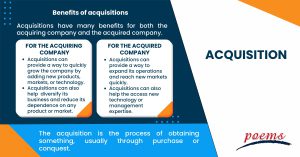- So My Company Just Got Acquired: Does This Happen in Marketing?
- What happens after your company is acquired?
- Does a company still exist after acquisition?
-
Do layoffs happen after acquisitions?
- Why Do Layoffs Occur After Acquisitions?
- Which Departments Are Most Affected by Layoffs After Acquisitions?
- How Do Companies Decide Who to Lay Off After an Acquisition?
- What Are the Legal Implications of Layoffs After Acquisitions?
- How Can Employees Prepare for Potential Layoffs After an Acquisition?
- Is it good for your company to be acquired?
- Frequently Asked Questions from Our Community
When a company gets acquired, it often sparks a wave of questions and uncertainty, especially for employees. In the marketing world, acquisitions are not uncommon, as larger firms frequently seek to expand their capabilities, client base, or market reach. For marketers, this can mean significant changes—new leadership, revised strategies, or even shifts in company culture. While acquisitions can bring opportunities for growth and innovation, they also raise concerns about job security, role adjustments, and alignment with new corporate goals. Understanding how acquisitions impact marketing teams and what to expect can help professionals navigate this transition with confidence and adaptability.
So My Company Just Got Acquired: Does This Happen in Marketing?
Yes, company acquisitions are quite common in the marketing industry. When a company is acquired, it often means that another business sees value in its services, client base, technology, or expertise. This can lead to significant changes, such as restructuring, rebranding, or integrating teams. For employees, this can be both exciting and uncertain, as roles and responsibilities may shift. However, acquisitions can also bring new opportunities, resources, and growth potential for the marketing team.
See Also In Your Opinion, What Are Some of the Best Gaming Marketing Campaigns?
In Your Opinion, What Are Some of the Best Gaming Marketing Campaigns?What Does an Acquisition Mean for Marketing Teams?
An acquisition can have a profound impact on marketing teams. It often means access to a larger budget, advanced tools, and a broader audience. However, it may also involve changes in strategy, leadership, or even job roles. Marketing teams must adapt quickly to align with the new company’s goals and culture.
How Do Acquisitions Affect Marketing Strategies?
After an acquisition, marketing strategies may need to be reevaluated. The acquiring company might have different target audiences, brand messaging, or campaign objectives. Marketers should collaborate closely with the new leadership to ensure a seamless transition and maintain brand consistency.
See Also Gen Z Broke the Marketing Funnel
Gen Z Broke the Marketing FunnelWhat Happens to the Brand After an Acquisition?
The fate of the brand post-acquisition depends on the acquiring company’s goals. Sometimes, the brand is absorbed into the parent company, while other times, it continues to operate independently. Marketers play a crucial role in managing this transition and communicating changes to customers.
How Can Marketers Prepare for an Acquisition?
Marketers can prepare for an acquisition by staying informed about the company’s direction, maintaining open communication with leadership, and being flexible. It’s also essential to document processes and campaigns to ensure a smooth handover if needed.
See Also Social Media Image Dimensions (Really Confused!)
Social Media Image Dimensions (Really Confused!)What Are the Benefits of an Acquisition for Marketers?
Acquisitions can bring numerous benefits to marketers, such as access to new technologies, expanded networks, and opportunities for career growth. However, it’s important to remain proactive and adaptable to make the most of these changes.
| Aspect | Impact |
|---|---|
| Budget | Potential increase in resources |
| Tools | Access to advanced marketing technologies |
| Audience | Expanded reach and new target markets |
| Strategy | Reevaluation and alignment with new goals |
| Brand | Possible rebranding or integration |
What happens after your company is acquired?

Integration of Teams and Operations
After a company is acquired, one of the first steps is the integration of teams and operations. This process involves aligning the acquired company's workforce with the acquiring company's structure. Key actions include:
- Reorganization of departments to eliminate redundancies and improve efficiency.
- Standardization of processes to ensure consistency across the organization.
- Communication strategies to keep employees informed and engaged during the transition.
Cultural Alignment and Change Management
Cultural alignment is crucial after an acquisition. The acquiring company must address cultural differences to ensure a smooth transition. This involves:
- Assessing cultural gaps between the two organizations.
- Implementing change management programs to help employees adapt to new norms.
- Promoting collaboration to foster a unified corporate culture.
Financial and Legal Adjustments
Post-acquisition, significant financial and legal adjustments are often required. These adjustments include:
- Consolidation of financial statements to reflect the new ownership structure.
- Review of contracts and agreements to ensure compliance with new policies.
- Tax and regulatory filings to meet legal obligations.
Technology and System Integration
Integrating technology and systems is a critical step after an acquisition. This process ensures that both companies operate seamlessly. Key steps include:
- Merging IT infrastructures to support combined operations.
- Data migration to consolidate information into a single platform.
- Training employees on new systems and tools.
Customer and Market Impact
The acquisition can have a significant impact on customers and market positioning. Companies must address:
- Customer communication to explain changes and reassure stakeholders.
- Rebranding efforts if the acquired company's identity is altered.
- Market strategy adjustments to leverage new strengths and opportunities.
Does a company still exist after acquisition?

What Happens to a Company After Acquisition?
After an acquisition, the fate of the acquired company depends on the terms of the deal and the intentions of the acquiring company. In some cases, the acquired company may continue to operate as a separate entity, while in others, it may be fully integrated into the acquiring company. Key factors include:
- Legal Structure: The acquired company may retain its legal identity if the acquisition is structured as a stock purchase.
- Brand Identity: The brand may continue to exist if it holds significant market value or recognition.
- Operations: Operations may remain independent or be merged with the acquiring company's processes.
Can an Acquired Company Operate Independently?
Yes, an acquired company can operate independently if the acquiring company chooses to maintain its autonomy. This is common in cases where:
- Strategic Value: The acquired company has unique expertise or market presence that benefits the parent company.
- Brand Equity: The brand is too valuable to dissolve or merge.
- Regulatory Requirements: Legal or regulatory constraints necessitate separate operations.
How Does an Acquisition Affect Employees?
Acquisitions can significantly impact employees of the acquired company. The effects may include:
- Job Security: Some employees may face layoffs due to redundancies.
- Role Changes: Employees may be reassigned to new roles or departments.
- Cultural Shifts: The company culture may change as it integrates with the acquiring company.
What Happens to the Acquired Company's Assets?
The acquiring company typically gains control over the acquired company's assets, which may include:
- Physical Assets: Property, equipment, and inventory.
- Intellectual Property: Patents, trademarks, and copyrights.
- Financial Assets: Cash reserves, investments, and accounts receivable.
Does the Acquired Company's Leadership Change?
Leadership changes are common after an acquisition, depending on the acquiring company's strategy. Possible scenarios include:
- Retention: Key executives may be retained to ensure continuity.
- Replacement: New leadership may be brought in to align with the acquiring company's vision.
- Integration: Leadership roles may be merged or restructured to fit the new organizational hierarchy.
Do layoffs happen after acquisitions?
_Easy-Resize.com.jpg)
Why Do Layoffs Occur After Acquisitions?
Layoffs often happen after acquisitions due to the need for cost-cutting, streamlining operations, and eliminating redundant roles. When two companies merge, there is often an overlap in departments, such as HR, marketing, or IT, which leads to workforce reductions. Additionally, acquiring companies may aim to align the new structure with their strategic goals, which can result in layoffs.
- Cost-cutting: Acquisitions are expensive, and layoffs help reduce operational expenses.
- Streamlining operations: Duplicate roles are eliminated to improve efficiency.
- Strategic realignment: The acquiring company may restructure to focus on its core business objectives.
Which Departments Are Most Affected by Layoffs After Acquisitions?
Departments that are most affected by layoffs after acquisitions typically include administrative, HR, and IT, as these functions often overlap between the two companies. Sales and marketing teams may also face cuts if the acquiring company already has a strong presence in the same market.
- Administrative roles: Often redundant in merged organizations.
- HR departments: Merged companies rarely need two separate HR teams.
- IT teams: Systems integration can reduce the need for duplicate IT staff.
How Do Companies Decide Who to Lay Off After an Acquisition?
Companies typically base layoff decisions on factors such as role redundancy, performance evaluations, and seniority. They may also consider the strategic importance of certain roles to the merged entity's future goals.
- Role redundancy: Employees in overlapping positions are often the first to go.
- Performance evaluations: Lower-performing employees may be let go to retain top talent.
- Seniority: In some cases, newer employees are laid off before long-term staff.
What Are the Legal Implications of Layoffs After Acquisitions?
Layoffs after acquisitions must comply with labor laws, including notice periods, severance pay, and anti-discrimination regulations. Failure to adhere to these laws can result in lawsuits or penalties.
- Notice periods: Many jurisdictions require advance notice of layoffs.
- Severance pay: Employees may be entitled to compensation based on their tenure.
- Anti-discrimination laws: Layoffs must not target employees based on protected characteristics.
How Can Employees Prepare for Potential Layoffs After an Acquisition?
Employees can prepare for potential layoffs by updating their resumes, expanding their professional networks, and developing new skills. Staying informed about the company's post-acquisition plans can also help them anticipate changes.
- Update resumes: Highlight achievements and skills that make them valuable to other employers.
- Expand networks: Networking can open up new job opportunities.
- Develop new skills: Learning in-demand skills increases employability in a competitive job market.
Is it good for your company to be acquired?

What Are the Potential Benefits of Being Acquired?
Being acquired can offer several advantages for a company, depending on the circumstances and the acquiring entity. Here are some key benefits:
- Access to greater resources: An acquisition often provides access to more financial, technological, and human resources, enabling the company to scale operations more effectively.
- Market expansion: The acquiring company may have a broader market reach, allowing the acquired company to expand its customer base and enter new markets.
- Enhanced expertise: The acquiring company might bring specialized knowledge, skills, or technology that can improve the acquired company's products or services.
What Are the Risks of Being Acquired?
While there are benefits, being acquired also comes with potential risks that need to be carefully considered:
- Loss of autonomy: The acquired company may lose control over its decision-making processes, as the acquiring company often takes the lead in strategic decisions.
- Cultural clashes: Differences in corporate culture between the two companies can lead to conflicts and reduced employee morale.
- Integration challenges: Merging operations, systems, and teams can be complex and time-consuming, potentially disrupting business continuity.
How Does an Acquisition Impact Employees?
An acquisition can have significant implications for employees, both positive and negative:
- Job security: Employees may face uncertainty about their roles, with potential layoffs or restructuring.
- Career growth: On the positive side, employees might gain access to new opportunities for career advancement within the larger organization.
- Changes in work culture: The shift in management and company culture can affect employee satisfaction and productivity.
What Should a Company Consider Before Agreeing to an Acquisition?
Before agreeing to an acquisition, a company should evaluate several factors to ensure it aligns with its goals and values:
- Strategic fit: Assess whether the acquiring company's vision and goals align with those of the company being acquired.
- Financial terms: Evaluate the financial offer, including the valuation, payment structure, and potential for future growth.
- Long-term impact: Consider how the acquisition will affect the company's brand, operations, and stakeholders in the long run.
How Can a Company Prepare for an Acquisition?
Proper preparation is crucial to ensure a smooth acquisition process and maximize the benefits:
- Conduct due diligence: Thoroughly research the acquiring company to understand its financial health, culture, and strategic intentions.
- Strengthen internal processes: Ensure that the company's operations, finances, and legal matters are in order to facilitate a seamless transition.
- Communicate with stakeholders: Keep employees, customers, and investors informed to maintain trust and transparency throughout the process.
Frequently Asked Questions from Our Community
What does it mean when a company gets acquired in the marketing industry?
When a company gets acquired in the marketing industry, it typically means that another business has purchased it, either to expand its own capabilities, gain access to new clients, or eliminate competition. This is a common occurrence in marketing, as the industry is highly competitive and constantly evolving. Acquisitions can lead to changes in leadership, branding, and operational strategies, but they also offer opportunities for growth and innovation.
How does an acquisition affect the employees of a marketing company?
An acquisition can have a significant impact on employees. While some may experience job security and new opportunities for career growth, others might face layoffs or role changes as the new owners restructure the organization. It’s important for employees to stay informed about the acquisition process and communicate openly with management to understand how their roles might evolve.
What are the benefits of an acquisition for a marketing company?
An acquisition can bring several benefits to a marketing company, including access to new resources, technologies, and expertise. It can also expand the company’s client base and market reach. Additionally, being part of a larger organization can provide greater financial stability and opportunities for employees to work on more diverse and high-profile projects.
Are acquisitions common in the marketing industry?
Yes, acquisitions are quite common in the marketing industry. The sector is dynamic, with companies constantly seeking to innovate and stay ahead of competitors. Larger firms often acquire smaller agencies to enhance their service offerings or enter new markets. This trend is driven by the need to adapt to changing consumer behaviors and technological advancements.
Leave a Reply


Articles of interest